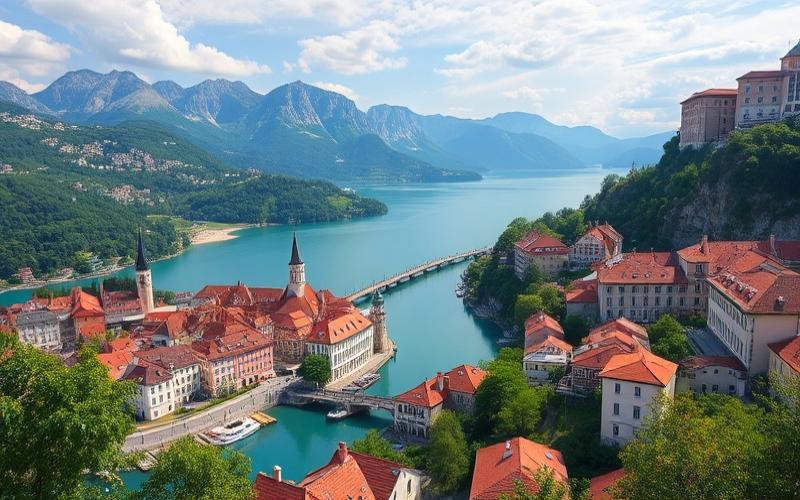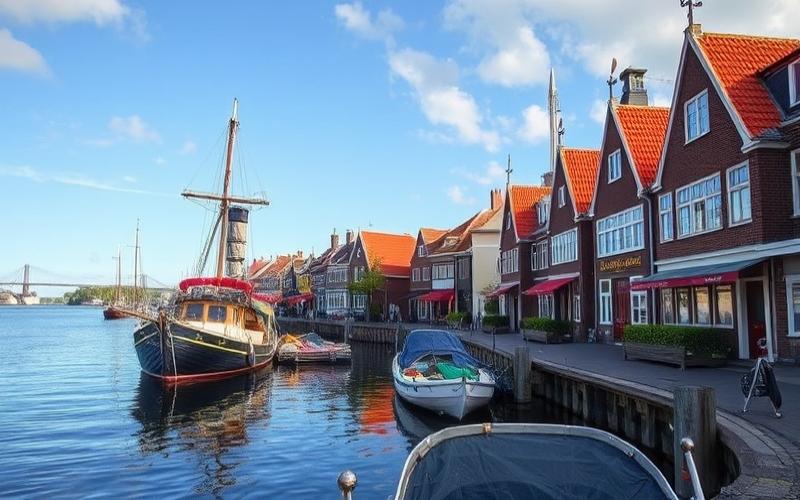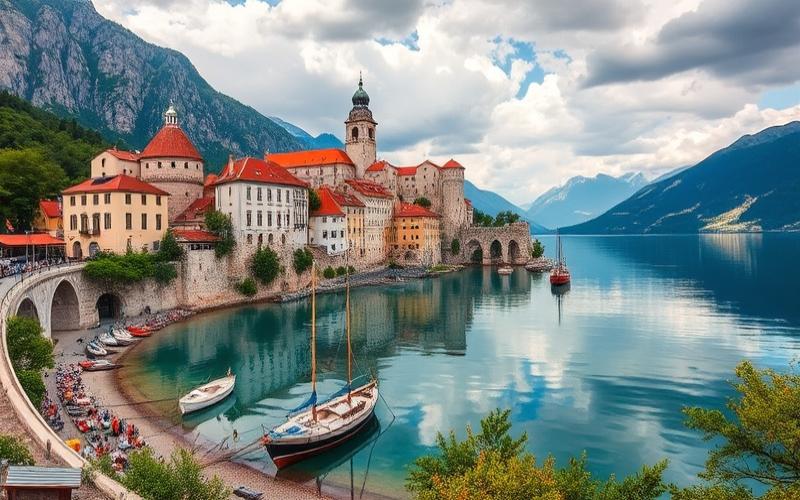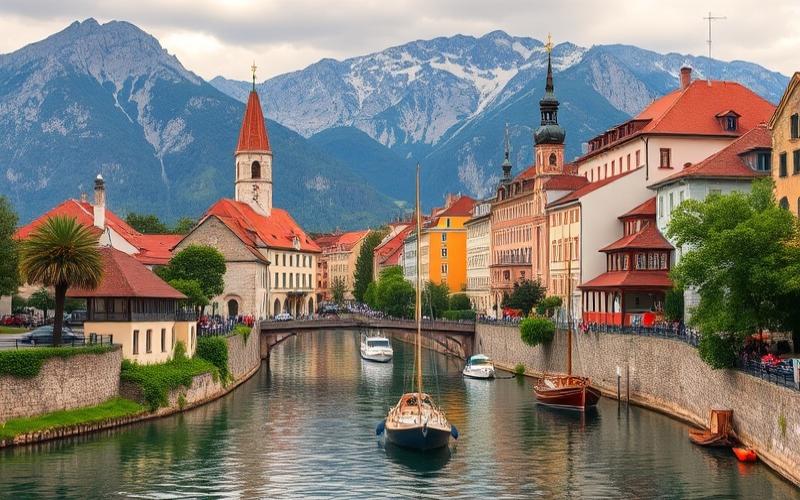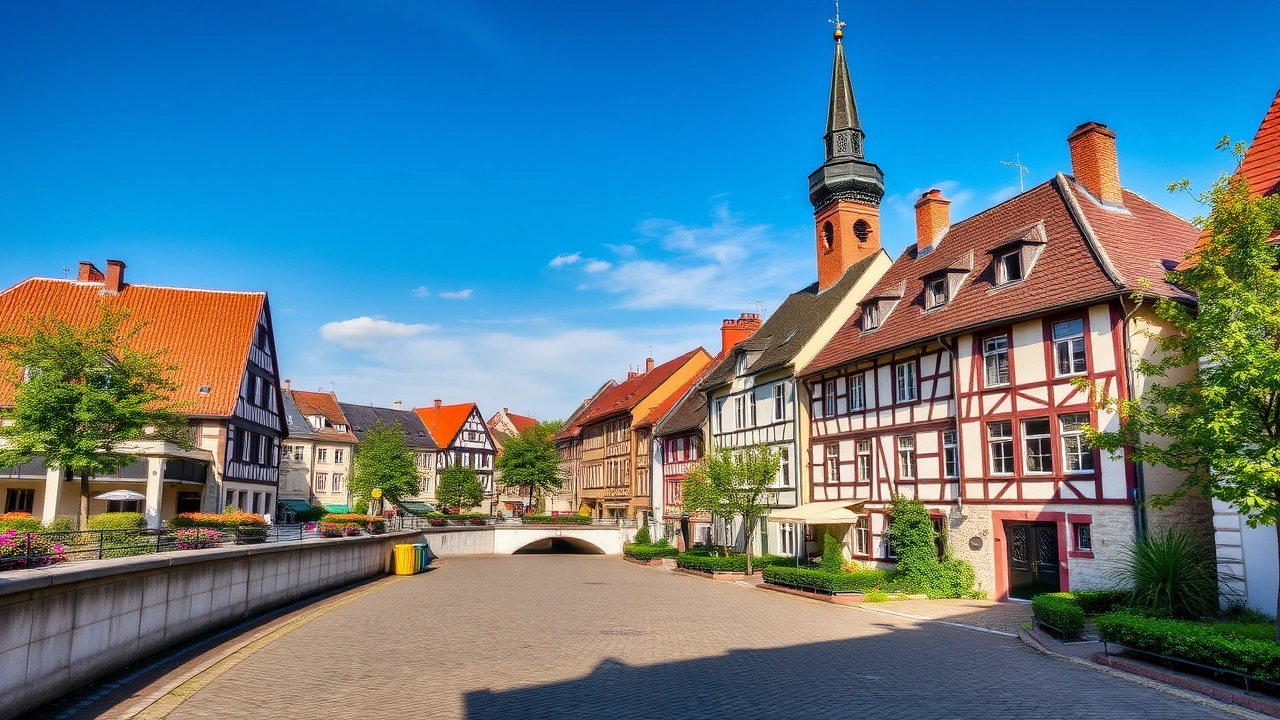
 Published on and written by Cyril Jarnias
Published on and written by Cyril Jarnias
Purchasing Agricultural Land in Croatia: Complete Guide
Purchasing agricultural land in Croatia can be a rewarding venture, but also involves legal complexities that require special attention. In this guide, we explore the essential aspects of the process, from restrictions for foreign buyers to key purchase steps, to provide you with all necessary information to confidently navigate the Croatian market.
As Croatia continues to attract investors with its fertile land and temperate climate, it’s imperative to consider local regulations and legal specificities that may influence your decision. Whether you’re a young agricultural entrepreneur or an experienced investor, this guide offers a clear and concise overview of the steps to follow to realize your project in compliance with Croatian laws.
Good to Know:
Non-European nationals may face additional restrictions when purchasing agricultural land in Croatia. It’s recommended to consult a notary or specialized lawyer before taking any steps.
Buying Agricultural Land in Croatia: Essential Legal Basics
Key Laws and Regulations
Agricultural Land Act: Agricultural land receives special protection in Croatia. The purchase of this land is strictly regulated to preserve its use and the public interest.
Regulations for Non-Residents:
- Until July 2023, a moratorium prevented foreigners (including EU citizens) from purchasing agricultural land without establishing a local company.
- Since the moratorium was lifted, private citizens and companies from the European Union can directly acquire agricultural land, subject to compliance with national laws.
- Non-EU nationals remain subject to stricter restrictions or the requirement of a bilateral agreement.
Purchase Procedure & Required Documents
- Preliminary Verification:
- Consult the local urban plan to confirm classification (agricultural/buildable/other).
- Verify agricultural zoning and local rights (potential customary or community rights).
- Required Documents:
- Written sales contract
- Official cadastral certificate
- Notarized seller declaration regarding absence of mortgage/dispute
- Proof of citizenship (for foreign buyers)
- Official proposal for land registry registration
- Registration:
- The transfer must be registered with the land registry through an authentic act.
Taxes & Legal Fees
| Type of Fee | Amount / Rate |
|---|---|
| Transaction tax | 3% of declared amount |
| VAT (new only) | 25% |
| Notary fees | According to national scale |
| Attorney fees | Variable depending on complexity |
| Cadastral fees | Nominal |
Role of Notaries & Lawyers
- Notary
- Authenticates the sales contract.
- Verifies identity, legal capacity, absence of mortgage debts or ongoing disputes.
- Lawyer
- Conducts thorough due diligence: checks titles, mortgage history, cadastral compliance.
- Assists with all administrative procedures.
Careful verification by these professionals is essential to ensure the property is freely transferable, without hidden litigation or administrative restrictions.
Due Diligence: Titles & Land Use
- Mandatory checks:
- Actual existence and exact legal status via updated cadastre/land registry
- Compliance with local development plans; clear identification if agricultural land or other type
- Research on potential preferential rights held by local communities or the State
Local Community Rights & Agricultural Zoning
- Certain local communities may have priority rights during public sales;
- Zoning precisely determines what can – or cannot – be developed/built: any transformation requires municipal authorization compliant with the local plan.
Direct acquisition by European nationals primarily results from obligations related to Croatia’s EU membership:
- The transitional period negotiated during accession allowed gradual access to agricultural land markets to avoid massive speculation harmful to traditional Croatian farmers.
- Since July 2023, this derogatory regime is no longer extended: there is now alignment with the fundamental European freedom regarding agricultural real estate acquisitions between EU members.
Systematic legal due diligence remains essential before any acquisition to guarantee asset security and regulatory compliance.
Good to Know:
In Croatia, purchasing agricultural land is primarily governed by the Agricultural Land Act and the Notary Act, with restrictions applying to non-residents, although EU citizens benefit from facilitated access following the country’s EU accession in 2013. The purchase procedure requires a sales contract, verification of property titles, and compliance with agricultural zoning, often managed by local authorities who also protect rural community rights. Notaries play a crucial role in certifying transactions, while lawyers assist in the due diligence process to ensure absence of disputes and irregularities. Buyers should anticipate notary fees, transfer taxes, and potential additional costs related to obtaining documents such as cadastral certificates. Due diligence is essential to avoid future problems, particularly regarding land use. Additionally, it’s advisable to inquire about available agricultural subsidy systems to optimize investment within the framework of the EU Common Agricultural Policy.
Preventing Risks of Non-Buildable Land in Croatia
Land is designated as non-buildable under Croatian legislation when it doesn’t meet the technical and legal criteria required to accommodate construction. Main criteria include:
- The land must be located in an area classified as buildable by the local urban plan or any other official planning document (PLU, GUP, municipal map).
- It must have access roads and allow connection to public networks (electricity, drinking water, sanitation). If these facilities don’t exist, their installation must be technically possible.
- Soil quality must allow construction without major risks.
- Restrictions may apply to protect people, the environment, or classified natural sites.
Usage Restrictions on Non-Buildable Land:
- Prohibition of any residential or commercial construction.
- Only certain agricultural structures may be authorized on agricultural land (farms, greenhouses…), subject to compliance with local development plans and minimum area requirements imposed by each municipality.
- In protected areas (approximately 38% of Croatian territory), any form of construction is highly regulated or even prohibited.
Legal and Financial Consequences for Non-Compliance:
| Consequence | Description |
|---|---|
| Administrative sanctions | Work cancellation; demolition obligation |
| Fines | Financial penalties reaching several thousand euros |
| Civil liability | Compensation for damages caused to others or the environment |
| Administrative blockage | Future impossibility to obtain permits or connections |
Tools and Resources to Verify Legal Status Before Purchase:
- Direct consultation of local urban plan at the town hall
- Access to Croatian national cadastre
- Verification with competent urban planning ministry
- Official written request regarding land urban designation
Recommended Preventive Legal Measures:
- Hire a certified architect for technical and regulatory project analysis.
- Seek assistance from a notary specialized in local land transactions.
- Obtain written certification on buildable/non-buildable status from municipal authorities before final signing.
Practical Tips for Potential Buyers:
Before any financial commitment:
- Always consult a local expert mastering specific urban regulations of the concerned municipality.
- Require detailed cadastral verification and an official copy of applicable urban zoning for the targeted land.
- Never rely solely on oral statements; request all supporting documents signed by competent authorities.
- Become aware of any public or private easements affecting the land (road access, networks…).
Frame all these steps in the initial contract so the purchase is conditional on written confirmation that the property conforms to the intended project.
Exercising vigilance during land purchase in Croatia not only helps avoid future disputes but also secures your investment against administrative and financial risks related to non-buildable land.
Good to Know:
In Croatia, land is considered non-buildable if classified outside urbanizable zones defined by local urban plans and environmental protection regulations, often designated for agricultural or protected use. Any construction on this land is strictly prohibited and can lead to legal sanctions and significant fines. To prevent these risks, it’s crucial to use the online cadastre and verify the Land Use Plan with local authorities. Consulting local experts such as lawyers specialized in property law and surveyors is also essential for comprehensive risk assessment. Before purchase, thorough steps should be taken to ensure the legal status and associated restrictions of the land, thus avoiding damaging financial implications.
Building Permits and Rural Zoning in Croatia
Procedure for Obtaining Building Permit in Croatia
- Application is submitted to the town hall or competent urban planning service, sometimes via the national electronic platform (ePermit).
- Local authorities process the file, potentially consulting other agencies depending on project nature (environment, heritage…), then issue the permit.
- Average processing time is generally 2 months.
Required Documents
List of frequently required documents:
- Official application form
- Main project certified by architect and involved designers
- Written report on main project control (if required)
- Nostrification certificate for projects following foreign standards
- Proof of legal interest (cadastral extract proving ownership or real right on land)
- Certificates attesting project compliance with special regulations (environmental, heritage…)
- Brief description and site plan/layout
- Proof that investor is authorized to build (concession or agreement if necessary)
Practical Example: Simplified Procedure
| Step | Detail |
|---|---|
| File submission | At town hall/urban planning service/local or via ePermit |
| Processing | Potential consultation of specialized public agencies |
| Timeline | Approximately 2 months |
| Decision notification | Approval/refusal transmitted to applicant |
Rural Zoning in Croatia
Croatian territory is divided into several main categories:
- Urban areas:
- Residential/commercial construction possible under local conditions.
- Rural/agricultural areas (“poljoprivredno zemljište”):
- Primary objective: agricultural exploitation.
- Construction limited to agricultural buildings strictly related to activity (barns, greenhouses…).
- Private residence generally prohibited except specific authorization and professional/agricultural justification.
- Any construction must respect minimum ratio between built surface and cultivated area.
- Protected/environmental areas:
- Very strong restrictions; any project must obtain specific environmental acceptability.
Summary Table of Possible Uses in Agricultural Zone
| Use | Permitted without restriction | Permitted with conditions | Prohibited |
|---|---|---|---|
| Agricultural exploitation | ✅ | ||
| Agricultural buildings | ✅ | ||
| Private residence | ❌(except exceptional derogation) | ||
| Industrial activities | ❌ |
Practical Tips for Agricultural Land Purchase
Systematically request an urban certificate before purchase: it guarantees buildability and absence of hidden easements.
A buyer who obtained this certificate discovers their land is buildable; if they don’t verify this point before purchase, they risk total construction prohibition after acquisition.
List of recommended verifications:
- Verify exact cadastral designation of land: consult official cadastral extract.
- Request urban certificate from local authorities.
- Ensure no easements or restrictions burden the property (protected area/non-buildable zone).
- Inquire about specific local procedures that may vary by municipality.
Recent Legislative Developments
Centralized electronic platforms have been recently established to harmonize and accelerate administrative procedures related to permits. Additional requirements regarding environmental impact are now more frequent in certain sensitive rural areas.
Practical tip: For any rural investment, collaborating with an experienced local architect often helps accelerate and secure all administrative procedures related to permits and zoning.
Good to Know:
In Croatia, obtaining a building permit for agricultural land requires submitting an application to the local authority of the concerned area, accompanied by documents such as cadastral plan, construction project, and proof of ownership; the process can take between 30 and 90 days depending on project complexity. Croatian rural zoning classifies land into several categories, including protected agricultural areas where constructions are strictly limited. Users should verify if their land belongs to a sector authorizing residential or commercial constructions before purchase, as recent legislation favors protection of agricultural land. To effectively navigate the Croatian legal system, it’s advisable to consult an experienced local lawyer, who can also provide advice on recent legislative revisions affecting land use.
Tips to Secure Your Investment in Agricultural Land
Verification of Legal Property Ownership
- Require updated vlasnički list (property certificate) obtained from Croatian land registry.
- Verify existence of encumbrances, mortgages, or third-party rights on the land.
- Ensure all potential co-owners have given written consent to the sale.
- Use cadastral number (Broj kat.cestice) to precisely identify the parcel.
Land Title Research
- Consult centralized land registry to verify ownership, easements, and permit compliance.
- Have due diligence conducted by local lawyer to control information accuracy and detect potential disputes.
- Require delivery of Tabuljarna Isprava (receipt confirming sale) after full payment.
Local Land Use Regulations
- Verify land classification (agricultural, residential, other) with Department of Construction and Spatial Planning.
- Confirm land is intended for agricultural use and no restrictions prevent exploitation or resale.
- For non-Croatian citizens, inquire about potential acquisition restrictions according to your nationality.
Relevant Tax Aspects
- Anticipate real estate acquisition tax, generally 3% of purchase price.
- Plan for notary, lawyer, registration fees, and potentially certified translation costs.
- Consider taxation on agricultural income if land is commercially exploited.
Engaging Local Professionals
- Systematically mandate a Croatian lawyer specialized in real estate law to:
- Verify property ownership and legal compliance of land.
- Prepare or review all contracts.
- Assist during notary signing.
- Engage a notary to formalize sale and register transaction in land registry.
- Consider consulting local tax advisor to optimize investment structure.
Obtaining Appropriate Insurance
- Purchase title insurance to protect against hidden property defects or future disputes.
- Subscribe to liability insurance if agricultural operation is planned.
- Evaluate need for multi-risk insurance covering installations, equipment, or natural risks.
| Step | Action to Take | Professional to Engage |
|---|---|---|
| Title verification | Analysis of vlasnički list and cadastre | Lawyer, notary |
| Encumbrance check | Search for mortgages, easements, co-owners | Lawyer, land registry |
| Urban compliance | Verification of zoning and permitted uses | Lawyer, local administration |
| Drafting and signing | Purchase contract, deposit with notary | Lawyer, notary |
| Sale registration | Registration in land registry, certificate obtainment | Notary, lawyer |
| Investment protection | Subscription to appropriate insurance | Insurance broker |
Key takeaway:
Securing an agricultural investment in Croatia requires heightened legal vigilance, intervention of qualified professionals, and appropriate insurance coverage. Never skip thorough verification, even if the procedure appears transparent.
Good to Know:
Before purchasing agricultural land in Croatia, it’s crucial to verify legal ownership by carefully analyzing land titles to avoid potential disputes. Ensure the seller legally owns the land by consulting the Croatian Land Registry and verify local regulations concerning land use, as certain areas are subject to specific restrictions. To navigate legal complexities, engage local professionals such as a lawyer or notary who can guide your purchase toward legal compliance; their expertise is particularly useful for interpreting tax implications of acquisitions and ensuring all documents are in order. Additionally, subscribing to appropriate insurance will protect your investment against potential legal or environmental issues.
Disclaimer: The information provided on this website is for informational purposes only and does not constitute financial, legal, or professional advice. We encourage you to consult qualified experts before making any investment, real estate, or expatriation decisions. Although we strive to maintain up-to-date and accurate information, we do not guarantee the completeness, accuracy, or timeliness of the proposed content. As investment and expatriation involve risks, we disclaim any liability for potential losses or damages arising from the use of this site. Your use of this site confirms your acceptance of these terms and your understanding of the associated risks.



